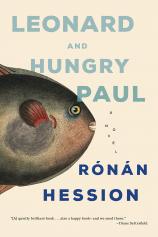Interview: May 13, 2021
Rónán Hession is an Irish writer and musician based in Dublin. His debut novel, LEONARD AND HUNGRY PAUL, asks a simple question: Can gentle people change the world? Newly released in paperback, it was shortlisted for an Irish Book of the Year award and selected by Dublin City Council as this year's One Dublin One Book. In this interview conducted by Michael Barson, Senior Publicity Executive at Melville House, Hession talks about the universal appeal of his novel, the important role that Hungry Paul’s sister plays in the story, the writers he admires, and his participation in close to 100(!) Zoom events since the book’s publication.
Question: Since this is your first novel, the passionate response it has earned over the past year must have taken you somewhat by surprise. To what do you attribute the way so many readers have embraced the book?
Rónán Hession: LEONARD AND HUNGRY PAUL is about the kind of people who often get overlooked in our noisy society. At its heart, it’s about the struggle to engage with the world without becoming overwhelmed by it. I think that resonates with people at this difficult time. The book’s positivity doesn’t come from pretending the world is simpler --- or nicer --- than it really is, but by paying attention to aspects of life that have perennial value. I think people also respond to the absence of cynicism in the book. As a writer, I try to look beyond critiquing the world to trying to imagine a way of being in the world without causing pain to myself or others. I’ll keep writing until I figure that out.
Q: You had been a successful songwriter and composer, but writing your first novel must have presented an entirely different set of challenges. What would you say was the most vexing part of the writing process for you while writing this book? And do you credit any other writers as influences or inspirations?
RH: I enjoyed writing the book --- I was like a kid in a sandbox. I have been creatively active since the early 1990s, so I have a developed a very stable and peaceful relationship with my creativity --- I respect it but don’t try to own it. This allows me to channel whatever comes to my imagination, though of course it takes deep concentration to be able to write a novel, which isn’t always easy to summon.
In terms of writers I admire, I am a huge fan of Japanese literature and admire Banana Yoshimoto, Sawako Ariyoshi, Yasunari Kawabata and Hiromi Kawakami. I also admire the creative courage of Korean writer Han Kang. My favourite writer is the Egyptian Nobel laureate Naguib Mahfouz. Perhaps most of all, I admire the genius of the translators who have brought these writers into the English language so that I can read them.
Q: LEONARD AND HUNGRY PAUL is often described as an inspirational story about gentle people, but there are certain scenes along the way that carry some serious friction. For instance, there’s an emotional confrontation between Grace and her brother Hungry Paul, as well as an intense exchange between Leonard and his would-be girlfriend Shelley.
RH: Those aren’t tense scenes in my opinion, because neither side is trying to win at the expense of the other. I think building a story around conflict is a very conventional --- and quite Anglophone --- way of constructing narrative. In the scenes you mention, the characters are trying to make themselves understood and take risks to do that. Those risks perhaps create some suspense, but the heart of those scenes is about what people are prepared to share beyond self-interest --- love, in other words.
Q: While the book’s nominal stars are --- obviously --- Leonard and Hungry Paul, one could make a persuasive case that Grace carries at least as much weight in the story as the lads do (with Helen not so far behind). Grace is quite an original and memorable character in her own right!
RH: Grace is a generous and complex person, whose coping mechanism is to project competence. What we learn in life --- and see in the story --- is that society punishes competent and hardworking people by dumping on them. Grace’s story is central to the novel in that she helps us see what a bad deal the world gives to those who deliver its promises. She is given responsibility for Hungry Paul when they are young siblings, but nobody revisits that to recalibrate their relationship in adulthood. What Grace discovers is that love, when it is merely projected into the world, becomes adulterated by self-interest; true love --- like that between herself and her brother --- involves accepting the other person, and resisting the pressure to bend our relationships to fit life’s problems.
Q: The great city of Dublin has certainly responded to LEONARD AND HUNGRY PAUL with an impressive level of enthusiasm --- even making it the selection of the Dublin Library’s annual One Dublin, One Book event in April. Now it appears that the book also translates quite well here in the States, to judge by the effusive comments from so many American booksellers. Has that been an unexpected response?
RH: Very much so. I didn’t think the book would be published as I didn’t see how it fit into the hustle of the publishing world. The response has been like a Rube Goldberg mechanism where each unlikely reaction has led to another, even more unlikely, reaction. I think that slightly meandering route suits a book like this: it’s happy to find its way in the world on its own terms and at its own pace.
Q: With the pandemic having suspended most live bookstore author appearances for the past year, you have been quite active participating in Zoom events on both sides of the Atlantic, with more to come. What are some of the most interesting reactions readers have shared with you during these sessions?
RH: I have probably done about 100 Zoom events since the book came out. Often a book club will just drop me a DM on Twitter to say they are discussing it, and I’ll pop in to do a reading or a chat. I like art to be accessible like that. I think online events have democratised engagement with writers to some extent. It would be nice to do more events in the US, so bookshops and book clubs should get in touch if that would interest them.
I get regular messages from people telling me how the book has helped them with their grief. I also received a lovely message from a mother who said that the book helped her realise that her son is a sunfish --- a reference to the book, when Hungry Paul’s mother picks the sunfish as her favourite fish in the aquarium, as she couldn’t stand to think it would go unloved in the world.




